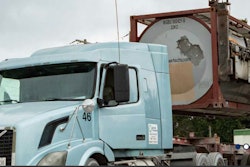 Pictured are Lee A. Klaskow, Bloomberg Intelligence senior freight transportation and logistics analyst; Steve Smith, senior industry advisor and president of Smith Transportation Consulting Services; KSMTA Canada Chief Operating Officer Chris Henry; and Zack King, former executive vice president and chief financial officer at USA Truck.
Pictured are Lee A. Klaskow, Bloomberg Intelligence senior freight transportation and logistics analyst; Steve Smith, senior industry advisor and president of Smith Transportation Consulting Services; KSMTA Canada Chief Operating Officer Chris Henry; and Zack King, former executive vice president and chief financial officer at USA Truck.
Cash is king but cash flow is its equally regal cousin, especially as we enter a period of economic volatility and uncertainty. However, Lee A. Klaskow, Bloomberg Intelligence senior freight transportation and logistics analyst, speaking at the American Trucking Associations Management Conference and Exhibition (MCE) in San Diego Monday, said he wasn't certain that a U.S. economic recession was imminent.
"It's scary out there," he said, adding the U.S. isn't currently in a recession, "but the likelihood is high" thanks to sputtering economic growth, higher fuel cots, a tight labor market and supply chain constraints creating inflationary pressure. Klaskow said the risk of the U.S. economy going into a recession is 60%, according to consensus estimates.
"Inflation is going to be with us for a bit," he said. "Any U.S. recession we have... will be short and shallow."
Bloomberg economic forecasts call for truckload and less than truckload carrier revenues to be flat or slightly down next year, and key drivers for revenue and earnings growth into 2023 among truckload carriers will be rate discipline as demand weakens; for LTL carriers, strong pricing through demand cycle.
Hold tight to rates
To get the most out of 2023 – or to simply get through it – some carriers are conceding the high ground they've had on rates for more than a year, but Steve Smith, senior industry advisor and president of Smith Transportation Consulting Services, said he's not seeing a lot of push for rate reduction as long as capacity is there, "so don't go ask for it."
Zack King, former executive vice president and chief financial officer at USA Truck (CCJ Top 250, No. 62), noted carriers often have trepidation in holding onto rates in an environment where shippers are pushing back and competitors are chopping theirs, but he said good carriers have an advantage on which they often don't capitalize: existing capacity.
Register today for "2023 Outlook for Trucking" webinar
Economists and industry experts discuss the market forces, business conditions and supply chain issues that will impact carrier operations in 2023. This complimentary CCJ webinar is sponsored by Bestpass. This CCJ webinar is sponsored by Bestpass.
"Pricing is a make versus buy decision," he said, noting shippers can't move the goods themselves as quickly or as cost effectively as they can with an existing carrier due to startup equipment acquisition costs and training.
"Whenever we went to a customer with a driver wage increase, we were never told no," King said. "We might not have gotten all we wanted, but the shipper understands the market has changed with regard to driver pay. When every customer they have is coming to them with an increase, they're a lot more open to it."
When shipper customers do push back, KSMTA Canada Chief Operating Officer Chris Henry said don't accept a first and final approach.
"You're being asked across the board to drop 10% to 15%, but that's a starting point. This is a negotiation," he said, adding that there may be margin to cut on some lanes and none on others. It's best to take a lane-by-lane approach to negotiation versus a unilateral cut. "On these lanes maybe I can do a little bit more because we're so dense, but on these lanes, we can't do much," Henry said.
Just because a shipper is asking for a rate reduction, King said don't be shy about asking for an increase if one is needed. However, a carrier might have to work with the shipper on a series of increases that get the rate where it needs to be.
"It's a series of small changes that you make," he said, adding that carriers can't blow up a relationship to improve it. "It's a progression over time."
Communicate challenges
Economic uncertainty can cause stress in the C-suite, but frontline workers often don't have insight into that pain, or know the role they play in causing it and fixing it.
"When times get tight, if people know their goals, they know the plan, and you stick to the plan, you'll come through," Smith said. "It's the knee jerk reactions (that don't work). You can't cut your way to profitability."
Smith suggests carriers meet with people, let them know their roles, and "they'll accept a little bump in the road."
Henry agreed, adding that company culture is what drives cash management.
"There's very little transparency from the C suite down to the front lines," he said "They don't really know how well or how poor the company is doing in this freight environment."
Henry challenged carriers to ask employees how much of every dollar the company gets to keep in profit. He said this exercise always proves revealing of employees' perception of profitability, noting he's seen ranges from zero cents to 60-plus cents of profit per dollar.
In the last down cycle in 2019, King said USA Truck talked to each employee about how each person's role affects the bottom line, adding "that's easy to do with drivers, driver managers .... but it's more difficult to do with A/P clerks or an HR representative."
Improve cash flow and keep growing
Fleets concerned about surviving through 2023, Smith said, need a plan to grow, control cost and get cash flow current.
"If you don't know what your [days sales outstanding] is, you can't fix it," he said. "If you can cut your DSO by two days, how much more cash does that give you to do the things that you need to do?"
Henry advised that carriers scrutinize each network by load, lane and bill-to, looking at revenue, cost and time.
"If you're responding to RFPs without this data, you're behind the eight ball," he said.
Through it all, the panel agreed, while it's important to have liquidity, it's unwise to simply hoard cash.
"No company I've ever worked for – and I've worked for FedEx, Yellow ... – we never had the mantra that we're too big to grow," Smith said. "Invest in your sales force. Put your money into improving the training and go after the lanes. Have your network evaluated and invest in those tools to help you understand your business."
King agreed, emphasizing the importance of being strategic when it comes to spending.
"Continue to invest in your good people – your drivers and your employees – because you want to make sure you can sustain that downturn in that cycle," he said.
King and Smith also cautioned against being overly conservative when it comes to spending money as a dollar saved today doesn't always equate to a dollar kept tomorrow.
"When the economy slows down, you want to extend the life of your equipment," Smith said. "You'll be paying people to fix your tractors. Always get current with your trade cycle. If you're not a big network, you cannot get off your set [trade cycle] plan. You will go down a repair and maintenance hole very quickly if you try to extend tractor life."
King said that can quickly put carriers "in a bubble" with no tractors or drivers, and getting these things back is much more expensive than simply keeping them.
"The best driver is typically the one you already have," Henry said, adding it costs a fleet upwards of $23,000 each time a driver walks out the door. And retention of non-drivers is just as important, Smith said. "Finding a good mechanic today is harder than finding a driver," he said.











